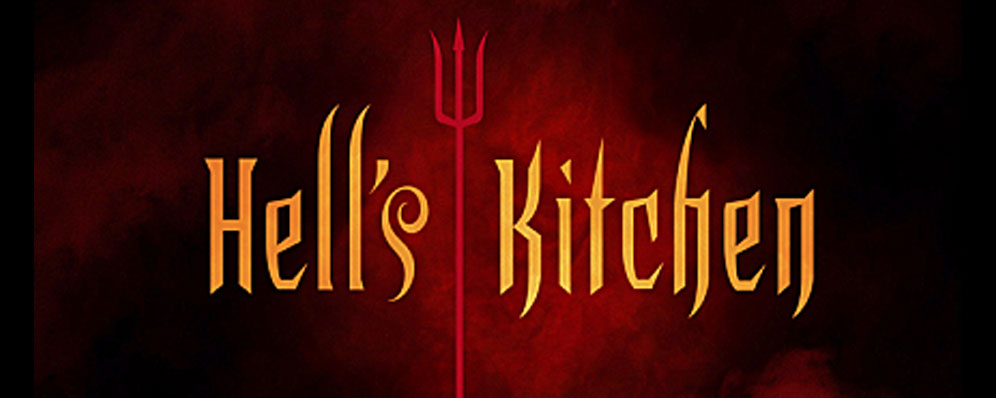If you’ve never seen Gordon Ramsay in action, think of him as a drill instructor for chefs. His restaurants have earned a total of 16 Michelin stars, he was awarded the OBE, and he’s had eight different television series in the UK and US combined. The guy not only knows food, he knows the business of food. On “Kitchen Nightmares,” failing restaurateurs ask Gordon to come in, eat their food, assess their business, then tell them what they’re doing right, what they’re doing wrong, and how to fix it. The ones that get it improve; the ones that dig their heels in and argue with him generally go out of business.
As I watched, it struck me that this is remarkably similar to what we do at The Editorial Department, only without the yelling and profanity.
Consider these points of comparison:
1. Two-thirds of all restaurants fail in their first year.
In 2009, the last year for which I could find concrete figures without spending several days online, more than a million books were published in the US. Estimates vary regarding what proportion of the books published every year are self-pubbed, but it’s generally believed to be at least half the total and possibly more.
That’s a lot of competition, so you need to go into it with your eyes open. You can be successful, but your expectations need to be realistic and you need to be prepared to work hard.
2. You’ve lost the plot.
This is what Gordon tells chefs who become engrossed in creating a dish so fancy they forget to make sure it tastes good and appeals to the restaurant’s clientele. A focused, clear plot is vital to keeping a reader turning pages, and you need to have a plot that’s appropriate to your genre. You may have delicious prose and tasty characters, but if you don’t have a good plot to keep it all moving, no one’s going to care.
3. Having a plan makes less work in the end, but be prepared to be flexible.
I’d estimate that 90% of the authors we work with say they hate outlining. They think it’s boring and will take all the fun of discovery out of writing. But the truth is outlining saves you work so you can have more fun. Having an outline – a recipe, if you will – doesn’t mean you can’t add a dash of something extra or vary the proportions a bit as you work, it just means the whole dish is a lot more likely to be yummy when you’re done.
4. Don’t cook for your ego; cook for your customers.
People write books for many reasons. Some feel driven to it. Some see it as a career opportunity. Some have a single story they want to share with a specific audience. Whatever your reasons, unless you don’t care about anyone reading your book ever, bear in mind that the experience of your book isn’t about you. Your creative vision is important, yes, but if the purpose of writing is to be read, then nothing is more important than reader expectations. You can give them more than they expect, but you can’t give them less.
5. No one ever orders the prawns in chocolate sauce more than once, so why are you insisting it’s your most popular dish?
You might be able to luck into major sales with a badly written and produced book, but why would you want to? If people are willing to take a chance on you as a new writer, your best bet for getting them to come back for more is to make their reading experience pleasurable. Selling one or two books may be really exciting in the beginning, but if you hope to build a reader base, you need to reach a lot of people who aren’t just happy you’re going to have a new book out, but impatient for its release. You want them to be booking tables years in advance, not just stopping in for a bite if they have nothing better to do.
6. Presentation is vital, but it’s never more important than the quality of the food.
Whether we’re talking about your query letter, nonfiction proposal, or book cover, it needs to be professional to appeal to readers, agents, and/or publishers. But the best query letter in the world won’t help you sell a novel that’s not ready for publication, the best proposal ever written won’t make an agent say “yes” to a manuscript that’s poorly researched and organized, and the Mona Lisa of book covers won’t get you good reviews on Amazon if the book is full of grammatical errors and cardboard characters. Focus on making the food itself irresistible before you start plating.
7. You’ve hired a team, and letting them do their jobs will make you look good.
Because creative people all tend to be a touch obsessive – a valuable survival technique for professions prone to a lot of rejection and self-doubt – they also tend to micromanage. Resist! When you hire an editor, designer, marketing consultant, or whatever the case may be, be clear about your artistic vision and professional goals, then go do your job and let them do theirs. They’re here to put their years of experience and hard-won knowledge to work for you, and they can’t do that if you’re constantly following them around the kitchen, demanding reassurance, second-guessing, and adding salt to their sauces when they’re not looking.
8. The key to a well-run kitchen is clear communication.
When a team effort is involved, even if it’s only a team of two, it’s vital that everyone understands the part of the work for which they’re responsible, and it’s just as vital that they ask for clarity when they don’t have that understanding. If you watch a busy, efficient kitchen, it’s full of people talking to each other. They’re not chatty and it’s serious business, but Gordon often tells chefs they need to make their needs clear, and the kitchen staff that they need to acknowledge their understanding of the chef’s needs. Working with editing and publishing professionals requires the same level of communication. We can’t help you if we don’t know what you want, and by the same token, we can’t expect you to know everything about publishing we do. Keeping the lines of communication open leads to better decision making by everyone.
9. Exotic flavors, elaborate plating and too many things on the menu will overwhelm the handful of things you do well.
The most obvious culprits here are nonfiction and historical fiction, where authors tend to want to use every bit of the research they’ve done, but it happens in all genres and categories: there’s stuff you really like, and you want it to be part of the book. But what you leave OUT is as much a part of what you write as what you put in, and everything in your manuscript must serve the plot (or in the case of nonfiction, your ultimate point). With thrillers, writers often try to pack in so many sub-plots it becomes impossible for the reader to keep up; with fantasy, world-building often devolves into sensory overload. It’s true at the sentence level, too: clarity should always take precedence over style. Rather than pairing every noun with a descriptor, be selective with your seasonings and add only a dash here and there, so the dish as a whole isn’t marred by too many competing flavors.
10. When you consult an experienced, respected professional, LISTEN.
Before you hire a professional editor, designer, or other consultant, ask yourself what you expect and want to get out of it. Do you simply want someone to encourage you? A friend or family member would be a better choice. Do you want someone you can boss around who won’t ever question you? Consider a personal assistant. However, if you want someone who’s only concern is helping you create something worthwhile, who’ll pat you on the back now and then but mostly will push you to do better, who provides experience and knowledge you don’t have, you’re ready to talk to a pro.
I could make more cheesy (groan) comparisons between writing and cooking, but I think you get it. Like Gordon Ramsay, we’ve been doing what we do for a long time now, we love to share our accumulated knowledge with others because that’s the joy of creating art, and we genuinely want the folks who work with us to succeed. Unlike Gordon, we won’t yell or swear at you.
Unless you want us to.
Looking for tough, fair, no-nonsense evaluative feedback from experienced editors who really know their stuff? Please visit our welcome center to get started or contact Ross Browne at the Tucson office.






